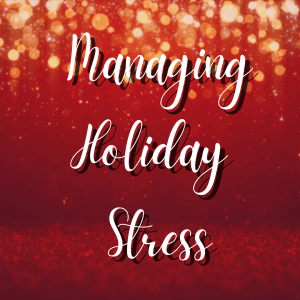 The festive period is a time for joy and celebration, and for many of us it’s a time for family and friends, giving gifts and eating wonderful food. However, for many it’s also a time of increased stress, from shopping, to cooking for the family, there can be a lot to do. Managing Christmas can easily become overwhelming, and it may seem like there is no time to destress. This blog will offer tips and advice on how to minimise stress during the holidays.
The festive period is a time for joy and celebration, and for many of us it’s a time for family and friends, giving gifts and eating wonderful food. However, for many it’s also a time of increased stress, from shopping, to cooking for the family, there can be a lot to do. Managing Christmas can easily become overwhelming, and it may seem like there is no time to destress. This blog will offer tips and advice on how to minimise stress during the holidays.
While the holidays are usually supposed to be a time for being with family and friends, last year was a little more difficult due to COVID restrictions. As this still might be the case for some families, it is still a major cause of stress for everybody. This added with the pressures of organising the perfect Christmas can be tough. But there are some ways that you can seek comfort and manage stress over this stressful season.
Holiday activities to manage stress
First thing first, get organised! There is so much to do in the lead up to Christmas, you might feel an overwhelming sense of pressure to get everything done in a few short weeks. Especially if you do not have too much time off work. Make a list of everything that needs to be done over the coming weeks. Such as shopping for presents and food, wrapping, decorating the house, and making any holiday preparations. Once you are a little more organised, you will feel that weight lifted knowing that you do have time to complete everything for a perfect Christmas.
Not everybody is lucky enough to have time off over Christmas. If you do, then this is an important time of the year to enjoy spending time with family at home. Even if you do not have a significant amount of time off, you should make time to do holiday activities with them, especially if you have children. It is the perfect time to get the entire family involved in decorating the tree, or making your own decorations. Put on a Christmas music playlist, get the family together and let go a little.
of the year to enjoy spending time with family at home. Even if you do not have a significant amount of time off, you should make time to do holiday activities with them, especially if you have children. It is the perfect time to get the entire family involved in decorating the tree, or making your own decorations. Put on a Christmas music playlist, get the family together and let go a little.
A great creative pasttime is to bake some holiday treats together. Perhaps get the kids to bake some holday treats with you. Even if you live alone, getting involved in some holiday baking or learning that perfect recipe for Christmas day can be almost theraputic if you enjoy being in the kitchen.
Coping with restrictions and loneliness
Of course, we cannot ignore the stress that the pandemic has brought. Unlike last Christmas, we are not yet stuck in another lockdown (fingers crossed!). But with the pandemic still happening and certain restrictions still in place, it can be difficult to spend Christmas with all of your loved ones. This can prove for an extremely lonely and anxious Christmas for some. While you may not be able to spend Christmas with family in person, thanks to social media it is somewhat easier to still be in touch with them. Set aside some time for a zoom call with your loved ones. Perhaps organise a Christmas quiz night or something similar to experience that united holiday feel. Call your friends and wish them happy holidays, you don’t have to spend Christmas completely alone!
If everything is proving too stressful, it may be time to practice some self care. Have a relaxing bath at the end of a long day to wash away the stress. Switch off from the pressures of the holidays for an evening, turn off your phone and have some ‘me’ time. Do something you can shift your focus on like reading a book, or sewing. Practice meditation or yoga to switch off and reset your mind. This way you can think more clearly about the next few weeks.
Regardless of how you are spending Christmas, be mindful of your stress and wellbeing this year. For more tips on managing stress, visit our other blogs.







